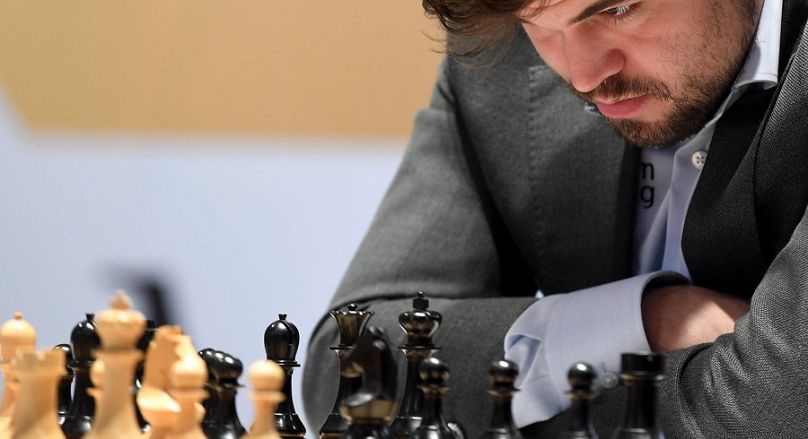Tom Schad, USA TODAY - Yesterday
Earlier this month, an up-and-coming American chess player named Hans Niemann beat five-time defending world champion Magnus Carlsen of Norway in convincing – and shocking – fashion at a tournament in St. Louis.

Norway's World Chess Champion Magnus Carlsen, makes a move in Game 5 against Ian Nepomniachtchi of Russia, during the FIDE World Championship at the Dubai Expo on Dec. 1, 2021.
Niemann, 19, cracked a wry smile in an interview after the match.
"It must be embarrassing for the world champion to lose to me," Niemann said. "I feel bad for him."
The match sparked a cheating scandal that has rocked the world of chess.
On Monday, after weeks of silent protests and cryptic messages, Carlsen formally accused Niemann of cheating in a statement on Twitter, saying in part that he believes the 19-year-old has "cheated more – and more recently – than he has publicly admitted."
As the drama continues to swirl, here's a quick primer on the cheating allegations, the players involved and what could happen next.
Who are Carlsen and Niemann?
Before going further, it's important to know the two players involved.
Carlsen, 31, is the greatest chess player of his generation. He was dubbed by 60 Minutes as "the Mozart of Chess" in a 2011 segment, which showed him playing 10 opponents simultaneously with his back turned, unable to see any of the pieces on the boards.
He's been ranked No. 1 in the world for more than a decade and won each of the past five chess world championships.
Niemann, meanwhile, is ranked No. 49 in the world but is in the midst of a meteoric rise. His Elo rating, which measures the strength of a chess player relative to his peers, has increased by 350 points in a span of four years – raising eyebrows among some of his competitors.
What sparked this feud?
Less than 24 hours after losing to Niemann at the Sinquefield Cup in St. Louis, Carlsen abruptly announced on Twitter that he had withdrawn from the tournament – a first in his career.
Though he did not explain his reasoning for the move, Carlsen posted a video clip of soccer manager José Mourinho saying, "If I speak, I am in big trouble."
Niemann's victory was shocking – and, from Carlsen's standpoint, suspicious – in part because the 19-year-old was playing with the black pieces, which is a distinct disadvantage especially at the upper echelons of competitive chess.
Related video: Carlsen Resigns After First Move Against Niemann: Chess Drama ExplainedDuration 1:07
Carlsen had also played an unusual sequence of moves in the match in an attempt to catch Niemann off guard. Niemann said afterwards that, in a coincidence, he had researched that odd sequence of moves – and figured out the best way to reply to them – earlier in the day.
Two weeks later, when Carlsen and Niemann met again in competition at a separate online tournament, Carlsen played just one move before resigning in protest.
What has Niemann said?
Though not directly accused of cheating at first, Niemann nevertheless came forward and admitted to cheating on two separate occasions earlier in his career.
Niemann said in an interview with the St. Louis Chess Club that when he was 12, he played in an online tournament on Chess.com for prize money and his friend used a chess computer, more commonly referred to as an engine, to feed him the best moves.
Then, when he was 16, Niemann said he cheated in lower-level games to improve his rating, because he wanted to play tougher opponents. (In general play, Chess.com matches opponents with comparable ratings.)
Niemann also said, "I have never cheated in an over-the-board game," referring to in-person chess matches like the one he played against Carlsen in St. Louis.
Is cheating possible in chess?
Yes – and some grandmasters have said it's not particularly difficult.
In online events, a player could do what Niemann admitted to previously doing – running a chess engine on a phone or other device that will spit out the best moves. "Over-the-board" cheating is more complicated, but American grandmaster Daniel Naroditsky is among those who say it's been happening "for decades" with the help of technology.
"If you put your mind to it, it is possible to set up a cheating mechanism – even in very high-profile tournaments," he said on his Twitch stream.
In separate incidents in 2015 and 2019, for example, top players were caught hiding phones in the bathroom, then checking moves during bathroom breaks.
Other potential methods include buzzer or signaling systems that could essentially nudge a top player in one direction or another at critical junctures. For top players, simply knowing whether to move one piece versus another might be enough to change the tenor of an entire match.
"I believe that cheating in chess is a big deal and an existential threat to the game," Carlsen said in his statement Monday. "I also believe that chess organizers and those who care about the sanctity of the game we love should seriously consider increasing security measures and methods of cheat detection for over-the-board chess."
What have those organizers said?
The day that Carlsen withdrew from the St. Louis tournament, organizers implemented additional security measures and touted their "fair play rules" as among the most comprehensive in chess.
The International Chess Federation (FIDE) also released a statement late last week. The organization's president, Arkady Dvorkovich, said he did not support Carlsen's decision to resign against Niemann but agrees that cheating is an important issue.
"Whether it is online or 'over the board,' cheating remains cheating," Dvorkovich said. "We are strongly committed to this fight, and we have invested in forming a group of specialists to devise sophisticated preventive measures that already apply at top FIDE events."
What's next?
Some grandmasters and others in the chess community have supported Carlsen but stressed that he should release evidence or a detailed explanation to support his actions. While Carlsen has now directly accused Niemann of cheating, he has not provided concrete evidence to support his claim.
"Unfortunately, at this time I am limited in what I can say without explicit permission from Niemann to speak openly," he said Monday.
Niemann had not publicly responded to Carlsen's statement as of Tuesday morning, and his representatives did not immediately reply to an email seeking comment.
Contact Tom Schad at tschad@usatoday.com or on Twitter @Tom_Schad.
This article originally appeared on USA TODAY: What we know: How a cheating scandal has rocked the world of chess
HOMOEROTICISM IN CHESS
Chess scandal: Out with anal beads, in with cheating accusations
Hans Niemann, accused of cheating - Copyright Chess world
By David Mouriquand • Updated: 27/09/2022 -
After weeks of anal bead jokes, conspiracy theories and cheating rumours that have rocked the chess world, the gloves are now truly off.
World Champion Magnus Carlsen has finally released a statement following his surprising defeat on 4 September at the Sinquefield Cup in Saint Louis to 19-year-old Hans Niemann, who has been accused of cheating online and using anal beads to… stimulate his chances of winning IRL.
We here at Euronews Culture are still trying to figure out quite how cheating-by-sex-toy works, but we’re trying out several vibrating configurations and will get back to you.
But back to Carlsen.
Last week, he quit an online game in the Julius Baer Generation Cup after playing only one move, leaving announcers shocked and escalating the controversy.
He has stated on Twitter on 26 September that he thinks Niemann is a cheater, over board and online. Furthermore, he now refuses to ever compete against him ever again.
“I believe that Niemann has cheated more - and more recently - than he has publicly admitted,” Carlsen wrote. “His over-the-board progress has been unusual, and throughout our game in the Sinquefield Cup I had the impression that he wasn’t tense or even fully concentrating on the game in critical positions, while outplaying me as black in a way I think only a handful of players can do.
The full statement in text:
Dear Chess World,
At the 2022 Sinquefield Cup, I made the unprecedented professional decision to withdraw from the tournament after my round three game against Hans Niemann. A week later during the Champions Chess Tour, I resigned against Hans Niemann after playing only one move.
I know that my actions have frustrated many in the chess community. I’m frustrated. I want to play chess. I want to continue to play chess at the highest level in the best events.
I believe that cheating in chess is a big deal and an existential threat to the game. I also believe that chess organizers and all those who care about the sanctity of the game we love should seriously consider increasing security measures and methods of cheat detection for over the board chess. When Niemann was invited last minute to the 2022 Sinquefield Cup, I strongly considered withdrawing prior to the event. I ultimately chose to play.
I believe that Niemann has cheated more — and more recently — than he has publicly admitted. His over the board progress has been unusual, and throughout our game in the Sinquefield Cup I had the impression that he wasn’t tense or even fully concentrating on the game in critical positions, while outplaying me as black in a way I think only a handful of players can do. This game contributed to changing my perspective.
We must do something about cheating, and for my part going forward, I don’t want to play against people that have cheated repeatedly in the past, because I don’t know what they are capable of doing in the future.
There is more that I would like to say. Unfortunately, at this time I am limited in what I can say without explicit permission from Niemann to speak openly. So far I have only been able to speak with my actions, and those actions have stated clearly that I am not willing to play chess with Niemann. I hope that the truth on this matter comes out, whatever it may be.
Sincerely,
Magnus Carlsen – World Chess Champion

Carlsen has yet to provide any actual evidence for the claims and he seems Carlsen to suggest that he is restricted for legal reasons. We’ll keep you updated on further developments.
Chess grandmaster denies cheating by using anal beads

If you thought that chess was boring, the Netflix show The Queen’s Gambit soon sorted that out.
However, some recent cheating accusations have just made the discipline a hell of a lot kinkier.
Indeed, 19-year old chess grandmaster Hans Niemann is currently at the heart of a scandal that is rocking the chess world. Or should that be, making the chess world vibrate.
Niemann has been hit with accusations on social media which state that the only reason he won against the world’s top grandmaster Magnus Carlsen earlier this month is that the young player cheated using wireless vibrating anal beads.
You read that right.
What happened (before anal beads got involved)?
The 4 September win at the Sinquefield Cup in Saint Louis represented something of a meteoric rise for Niemann and was unexpected, as Magnus had not been beaten in 53 sittings. Niemann was the lowest ranking of the 10 players in Saint Louis, and had become the first chess player to beat Carlsen in more than two years.
Carlsen decided to withdraw from the event following his loss.
“I’ve withdrawn from the tournament. I’ve always enjoyed playing in the Saint Louis Chess Club, and hope to be back in the future,” he tweeted.
The five-time World Chess champion also added a video of football coach Jose Mourinho’s 2020 news conference speech held after a game in which his team may have lost due to questionable officiating: “I prefer not to speak. If I speak I am in big trouble… and I don’t want to be in big trouble.”
No further explanation was provided, but many interpreted Carlsen’s post as insinuating that Niemann cheated during the game.
To further spice things up, the same day Carlsen withdrew (5 September), the World Chess Hall of Fame suspiciously decided to beef up its anti-cheating security measures. This included scanning Niemann before his next match.
Is Niemann guilty?
Though no concrete evidence has yet been brought forward to back accusations of cheating, a recent interview in which Niemann acknowledged that he had violated the rules in the past by using computer assistance in online games made the rounds.
In response, Chess.com stated that it had “privately removed” Niemann’s account from its website and the Global Championship in Toronto decided to uninvite Niemann.
Grandmaster Hikaru Nakamura said on his Twitch stream that “there was a period of over six months where Hans did not play any prize-money tournaments on Chess.com. That is the one thing that I’m going to say and that is the only thing I’m going to say on this topic.”
Except he didn’t limit it to that, saying that it was “a known fact” that Niemann had previously cheated on Chess.com, referring to the aforementioned interview.
As for grandmaster Eric Hansen, he added that he had removed Niemann from chess events he had hosted due to cheating suspicions.
When does the sex toy come into play?
The issue was already proving to be one of the biggest chess scandals in years, especially because it concerns Niemann, who is notorious in the chess community for his difficult behaviour.
Then, somewhat predictably when it comes to rumour mongering and drama stirring, Tesla CEO Elon Musk waded in.
Musk shared a video on Twitter of an influencer discussing the rumour that Niemann used a vibrating sex toy during the competition in order to cheat.
In a now deleted tweet, Musk even posted a Musk-version of a quote by philosopher Arthur Schopenhauer, writing: "Talent hits a target no one else can hit, genius hits a target no one can see (cause it's in ur butt)."
Charming.
Eventually, Niemann addressed the cheating allegations, admitting he had cheated during virtual Chess.com tournaments when he was younger. However, Niemann said, he never cheated IRL.
“I have never cheated in an over-the-board game. If they want me to strip fully naked, I will do it,” Niemann offered. “I don’t care. Because I know I am clean. You want me to play in a closed box with zero electronic transmission, I don’t care.”
So, a statistical anomaly? A targeted attack spread because Niemann’s abrasive personality is not to the community’s liking? Simply another case of social media being the bin juice of humanity? Or has Niemann elevated the dark art of cheating to a new elaborate level after watching Lock Stock And Two Smoking Barrels one too many times?
Whatever the case may be, if the Chess Federation want to strip players bare for the games just to avoid any cheating allegations, their viewing figures may well spike.
Let’s just hope that the second season of The Queen’s Gambit don’t take any ideas from this cheating saga – although Netflix are now greenlighting NC-17 rated content, no one needs to see squirming players climaxing before a checkmate.
Still, social media couldn’t get enough of it:

























